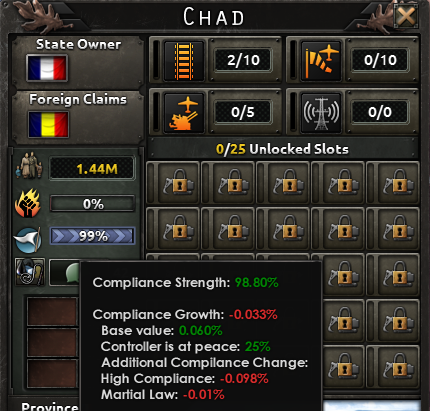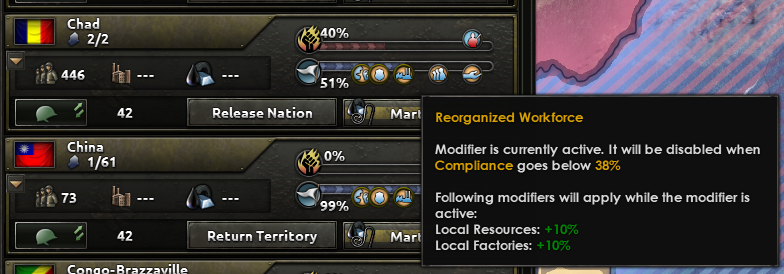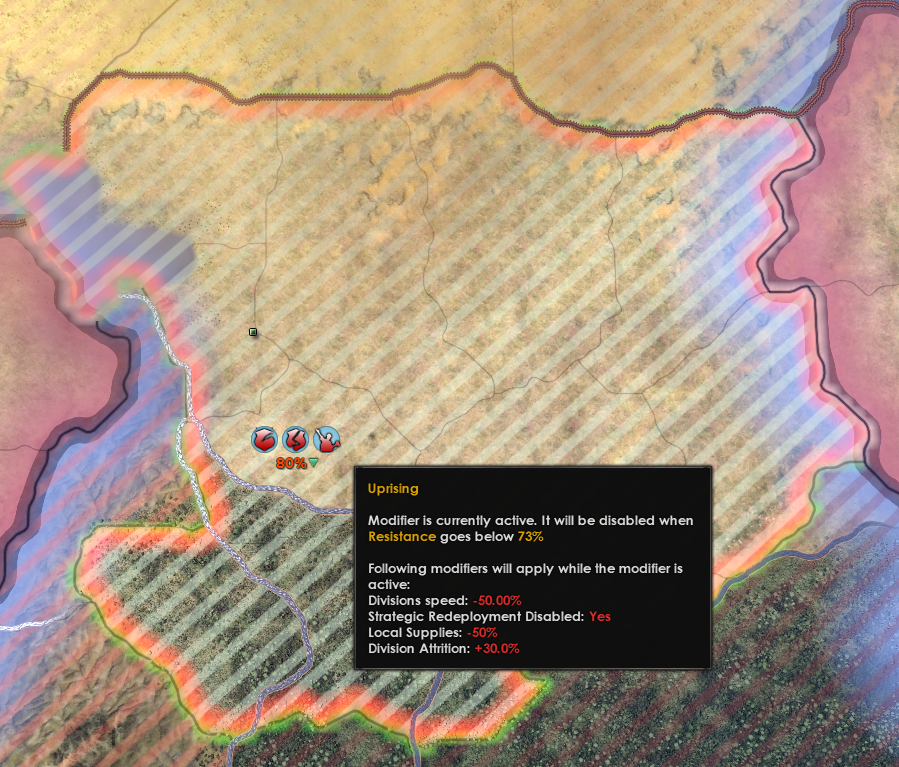Hello HoI bois and ladies, welcome to the second dev diary on our upcoming unannounced expansion and 1.8 ‘Husky’ update. This update features some big changes to how occupied territory functions. The biggest part of this is an overhaul of the game’s current resistance system into what we are calling the “Resistance and Compliance” system. This should help curb a bit of power from snowballing (Hello, Germany), remove gamey early war sniping of provinces, and put a bit of a clock on world conquest runs.
The old resistance system is rather simple. Each occupied state has a suppression requirement. If you meet that requirement nothing happens. If the suppression requirement is not met then you suffer from increasingly common sabotage to factories or infrastructure as resistance strength grows. We decided we could make this more interesting and use it as a way to further control the power of snowballing.
The growth of resistance is no longer stopped by having an adequate garrison. Resistance now functions with a target system. The resistance level will grow or decay towards whatever the current target is. The target is impacted by the development of the state, the core owner still existing and other factors. Resistance activities will still scale with the level of resistance, but the garrison will now work as a shield that absorbs these sabotages. If the garrison is adequate, the garrison shield will absorb the vast majority of sabotage attempts and take losses to manpower and equipment. Not having an adequate garrison means a higher resistance target and more resistance activity making it past the garrison shield to the state.

Compliance is in some ways the opposite of resistance. It is a rating of how willing the local state is to work with their occupiers. Compliance will normally start at zero and increase slowly over time. Compliance growth will generally be slow and several factors can affect that speed of growth. As compliance increases in a state, it will decrease local resistance and give access to more resources, factories, and manpower.

Resistance and compliance also will have various effects that are unlocked. Resistance will gain the ability to more frequently bypass the garrison shield after it reaches a strength of 25%. Reaching 25% compliance means reducing suppression requirements for the current level of resistance.

The highest level of resistance unlocks include two levels of uprising. The first is a passive malus that is applied to the state, adding attrition, decreasing move speed, and slowing org regain for occupying forces in the area. The 2nd level uprising is a full scale organized uprising that functions somewhat like a civil war. The states that rise up will gain low-quality divisions and either rejoin their former master or if that no longer exists, reestablish themselves on the map. Both of these should be somewhat rare and will require the local resistance being supported by an outside source.

In conjunction with these new systems, we have reworked how occupied states are handled. Colony states will be removed as a concept and every state not controlled by a nation with a core on the state will be viewed as occupied. Occupied states will now be less rewarding for the occupier. Access to the factories and resources of the state will by default be much lower than before. However, the conqueror can get more out of the state by cultivating compliance or adjusting occupation laws. This gives a bit of granularity between what was previously colony states and cores.
Occupation laws will also be updated to work with the new resistance and compliance systems and give the player more choice. Previous occupation laws were mostly a linear system of paying PP and increasing suppression need for increasing rewards. If you could afford it, harsher occupation would almost always be more beneficial. This was also a system not a lot of people interacted with as it was hidden behind several layers of the menu.
New occupation laws are built around trying to give the player choice based on playstyle and short and longterm goals. The new laws tend towards one of three objectives: compliance growth, resistance suppression, factory/resource exploitation. Compliance growth is a longterm reward, while resistance suppression and resource gains are more short term. These laws will, in turn, be bad at what they are not concerned with. IE focusing on resistance suppression will generally not be very rewarding in terms of resources or long term compliance growth. Cultivating compliance will mean that the player will have to deal with a period of low yields and maybe a more active resistance movement. Each of the big three ideologies will also get their own special occupation laws. These laws fit the themes of the ideologies and give them some unique choices

That's all we got for this week. Next week we will update the good people of these forums on what is going on with France. Secrets and things hidden will be revealed!
The old resistance system is rather simple. Each occupied state has a suppression requirement. If you meet that requirement nothing happens. If the suppression requirement is not met then you suffer from increasingly common sabotage to factories or infrastructure as resistance strength grows. We decided we could make this more interesting and use it as a way to further control the power of snowballing.
The growth of resistance is no longer stopped by having an adequate garrison. Resistance now functions with a target system. The resistance level will grow or decay towards whatever the current target is. The target is impacted by the development of the state, the core owner still existing and other factors. Resistance activities will still scale with the level of resistance, but the garrison will now work as a shield that absorbs these sabotages. If the garrison is adequate, the garrison shield will absorb the vast majority of sabotage attempts and take losses to manpower and equipment. Not having an adequate garrison means a higher resistance target and more resistance activity making it past the garrison shield to the state.

Compliance is in some ways the opposite of resistance. It is a rating of how willing the local state is to work with their occupiers. Compliance will normally start at zero and increase slowly over time. Compliance growth will generally be slow and several factors can affect that speed of growth. As compliance increases in a state, it will decrease local resistance and give access to more resources, factories, and manpower.

Resistance and compliance also will have various effects that are unlocked. Resistance will gain the ability to more frequently bypass the garrison shield after it reaches a strength of 25%. Reaching 25% compliance means reducing suppression requirements for the current level of resistance.

The highest level of resistance unlocks include two levels of uprising. The first is a passive malus that is applied to the state, adding attrition, decreasing move speed, and slowing org regain for occupying forces in the area. The 2nd level uprising is a full scale organized uprising that functions somewhat like a civil war. The states that rise up will gain low-quality divisions and either rejoin their former master or if that no longer exists, reestablish themselves on the map. Both of these should be somewhat rare and will require the local resistance being supported by an outside source.

In conjunction with these new systems, we have reworked how occupied states are handled. Colony states will be removed as a concept and every state not controlled by a nation with a core on the state will be viewed as occupied. Occupied states will now be less rewarding for the occupier. Access to the factories and resources of the state will by default be much lower than before. However, the conqueror can get more out of the state by cultivating compliance or adjusting occupation laws. This gives a bit of granularity between what was previously colony states and cores.
Occupation laws will also be updated to work with the new resistance and compliance systems and give the player more choice. Previous occupation laws were mostly a linear system of paying PP and increasing suppression need for increasing rewards. If you could afford it, harsher occupation would almost always be more beneficial. This was also a system not a lot of people interacted with as it was hidden behind several layers of the menu.
New occupation laws are built around trying to give the player choice based on playstyle and short and longterm goals. The new laws tend towards one of three objectives: compliance growth, resistance suppression, factory/resource exploitation. Compliance growth is a longterm reward, while resistance suppression and resource gains are more short term. These laws will, in turn, be bad at what they are not concerned with. IE focusing on resistance suppression will generally not be very rewarding in terms of resources or long term compliance growth. Cultivating compliance will mean that the player will have to deal with a period of low yields and maybe a more active resistance movement. Each of the big three ideologies will also get their own special occupation laws. These laws fit the themes of the ideologies and give them some unique choices

That's all we got for this week. Next week we will update the good people of these forums on what is going on with France. Secrets and things hidden will be revealed!

